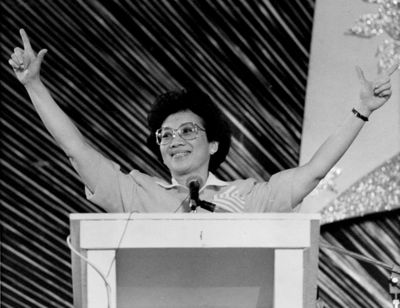Corazon Aquino, who led ouster of Marcos, dies

MANILA, Philippines – Former President Corazon Aquino, who swept away a dictator with a “people power” revolt and then sustained democracy by fighting off seven coup attempts in six years, died on Saturday, her son said. She was 76.
The uprising she led in 1986 ended the repressive 20-year regime of Ferdinand Marcos and inspired nonviolent protests across the globe, including those that ended communist rule in Eastern Europe.
But she struggled in office to meet high public expectations. Her land redistribution program fell short of ending economic domination by the landed elite, including her own family. Her leadership, especially in social and economic reform, was often indecisive, leaving many of her closest allies disillusioned by the end of her term.
Still, the bespectacled, smiling woman in her trademark yellow dress remained beloved in the Philippines, where she was affectionately referred to as “Tita (Auntie) Cory.”
Aquino was diagnosed with advanced colon cancer last year and confined to a Manila hospital for more than a month. Her son said the cancer had spread to other organs and she was too weak to continue her chemotherapy.
For the past month, supporters have been holding daily prayers for Aquino in churches in Manila and throughout the country. Requiem Masses were scheduled for later today, and yellow ribbons were tied on trees around her neighborhood in Quezon City.
President Gloria Macapagal Arroyo, who is on an official visit to the United States, said the Philippines will observe 10 days of national mourning.
Aquino’s unlikely rise began in 1983 after her husband was gunned down on the tarmac of Manila’s international airport as he returned from exile in the United States to challenge Marcos, his longtime adversary.
The killing enraged many Filipinos and unleashed a broad-based opposition movement that thrust Aquino into the role of national leader.